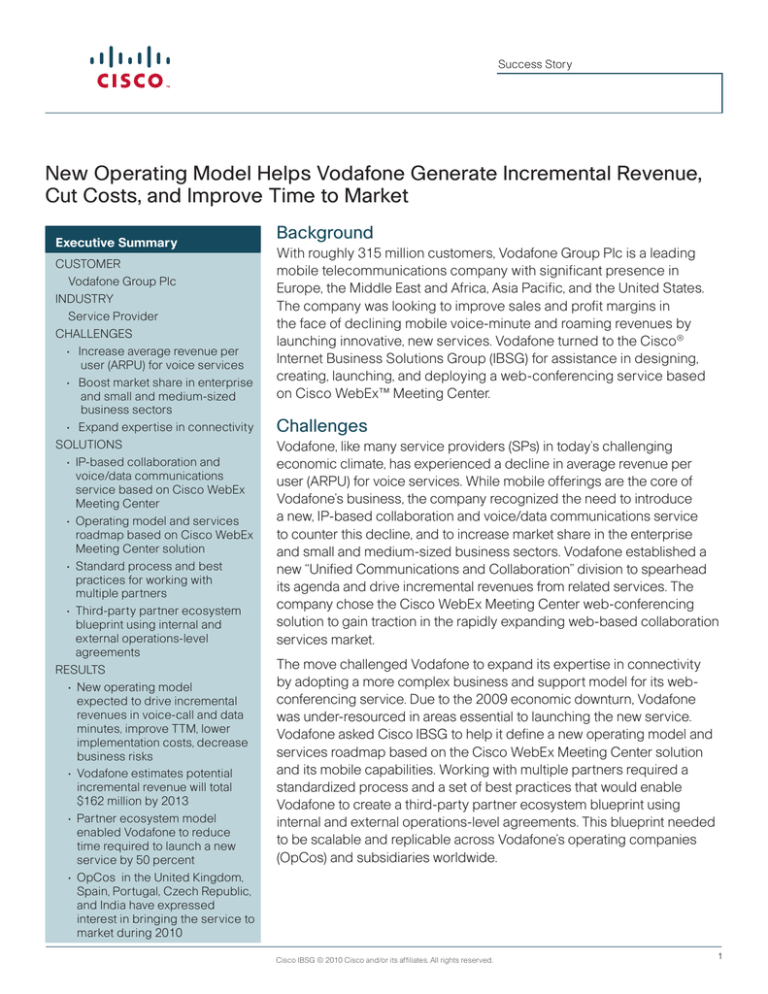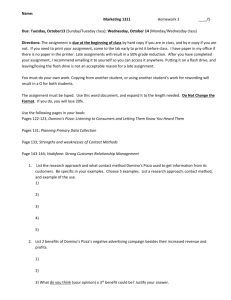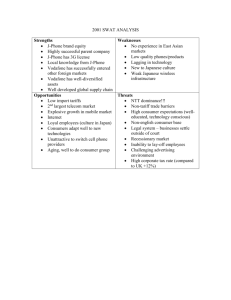
Success Story
New Operating Model Helps Vodafone Generate Incremental Revenue,
Cut Costs, and Improve Time to Market
Executive Summary
CUSTOMER
Vodafone Group Plc
INDUSTRY
Service Provider
CHALLENGES
• Increase average revenue per
user (ARPU) for voice services
• Boost market share in enterprise
and small and medium-sized
business sectors
• Expand expertise in connectivity
SOLUTIONS
• IP-based collaboration and
voice/data communications
service based on Cisco WebEx
Meeting Center
• Operating model and services
roadmap based on Cisco WebEx
Meeting Center solution
• Standard process and best
practices for working with
multiple partners
• Third-party partner ecosystem
blueprint using internal and
external operations-level
agreements
RESULTS
• New operating model
expected to drive incremental
revenues in voice-call and data
minutes, improve TTM, lower
implementation costs, decrease
business risks
• Vodafone estimates potential
incremental revenue will total
$162 million by 2013
• Partner ecosystem model
enabled Vodafone to reduce
time required to launch a new
service by 50 percent
• OpCos in the United Kingdom,
Spain, Portugal, Czech Republic,
and India have expressed
interest in bringing the service to
market during 2010
Background
With roughly 315 million customers, Vodafone Group Plc is a leading
mobile telecommunications company with significant presence in
Europe, the Middle East and Africa, Asia Pacific, and the United States.
The company was looking to improve sales and profit margins in
the face of declining mobile voice-minute and roaming revenues by
launching innovative, new services. Vodafone turned to the Cisco®
Internet Business Solutions Group (IBSG) for assistance in designing,
creating, launching, and deploying a web-conferencing service based
on Cisco WebEx™ Meeting Center.
Challenges
Vodafone, like many service providers (SPs) in today’s challenging
economic climate, has experienced a decline in average revenue per
user (ARPU) for voice services. While mobile offerings are the core of
Vodafone’s business, the company recognized the need to introduce
a new, IP-based collaboration and voice/data communications service
to counter this decline, and to increase market share in the enterprise
and small and medium-sized business sectors. Vodafone established a
new “Unified Communications and Collaboration” division to spearhead
its agenda and drive incremental revenues from related services. The
company chose the Cisco WebEx Meeting Center web-conferencing
solution to gain traction in the rapidly expanding web-based collaboration
services market.
The move challenged Vodafone to expand its expertise in connectivity
by adopting a more complex business and support model for its webconferencing service. Due to the 2009 economic downturn, Vodafone
was under-resourced in areas essential to launching the new service.
Vodafone asked Cisco IBSG to help it define a new operating model and
services roadmap based on the Cisco WebEx Meeting Center solution
and its mobile capabilities. Working with multiple partners required a
standardized process and a set of best practices that would enable
Vodafone to create a third-party partner ecosystem blueprint using
internal and external operations-level agreements. This blueprint needed
to be scalable and replicable across Vodafone’s operating companies
(OpCos) and subsidiaries worldwide.
Cisco IBSG © 2010 Cisco and/or its affiliates. All rights reserved.
1
Solutions
Partner Ecosystem: After assessing Vodafone’s key operational areas, including
service design, OpCo operations and support, marketing, and go-to-market
(GTM) activities, Cisco IBSG identified major challenges Vodafone had to
overcome before it could implement a sustainable partner ecosystem:
“As businesses continue
to look for ways to
reduce their overhead
while improving
productivity, we believe
that the flexibility and
ease of use offered by
Vodafone Web Conferencing presents
a compelling proposition. Through our
partnership with Cisco
IBSG, we are giving
customers greater
ability to choose how
and when they use web
conferencing to drive
their business forward
in a more efficient and
cost-effective way.”
Tom Craig
Director of Business Services
Vodafone Group Plc
• Sales: The Vodafone sales teams and resale channel partners were used
to selling mobile tariff plans and calling options. The language of webconferencing services, however, was new to them. As a result, Cisco IBSG
educated Vodafone’s sales staff on the new vocabulary and provided
appropriate tools, support, and compensation plans to help them sell
these new services effectively.
• Service Operations: Different working procedures and practices were
needed to reduce risk and simplify key operational areas. New services
such as web-based conferencing would align Vodafone business
operations that were previously separate. A new set of processes and
operational interlocks was implemented to allow different parts of the
business to interact with each other and with external partners and
agencies.
• Billing Systems: Billing integration is a major component of the serviceoperation model, and one of Vodafone’s most challenging areas. Billing
integration is influenced by different service-pricing packages such
as pay-per-use, flat fee, or a combination of the two. Specific billing
requirements, such as daily billing feeds (files), 100 percent accuracy of
billing data, prerated service prices from third parties, blended call data
record, and consolidated invoices, can further complicate the billing
integration process.
Furthermore, Vodafone OpCos have different IT system outsourcing partners,
which affects their operational capability and flexibility in billing and other key
areas. Because of this, Cisco IBSG recommended that billing requirements
should be well-drafted and agreed on by the third-party supplier in the early
stages of the on-boarding process. Only through early involvement will both
companies align billing capabilities with business requirements and implement
a cost-efficient and standardized billing solution.
By addressing these challenges, Vodafone and Cisco IBSG developed a partner
ecosystem blueprint based on an agile business model for delivering WebEx
Meeting Center services. Employing a software-as-a-service (SaaS) approach,
this model uses the Vodafone partner ecosystem as the sales, delivery, and
Tier 1 support channel (see Figure 1).
2
Cisco IBSG © 2010 Cisco and/or its affiliates. All rights reserved.
Success Story
Figure 1. Delivering Next-Generation Managed Services via an Agile Business Model
Source: Cisco IBSG, 2009
Vodafone Service-Operation Model
Service operation is the core of any SP’s business. This is where technology
and products are converted into services and revenues. Vodafone’s ability to
deliver highly qualitative services at competitive prices and healthy margins
is influenced largely by service-operation performance, including that of its
partners.
By out-tasking certain activities such as service fulfillment and assurance,
Vodafone can reduce the need for additional resources and avoid dramatic
changes to its business processes and IT systems. Based on its original
assessment of Vodafone’s operational practices, Cisco IBSG recommended
changes to Vodafone’s internal and external service-operation process. From
there, IBSG developed a modular set of processes for the web-conferencing
service. Figure 2 provides an overview of the process flow. One benefit of the
operational blueprint is that Vodafone can apply it to other services, such as
unified communications.
Cisco IBSG © 2010 Cisco and/or its affiliates. All rights reserved.
3
Figure 2. Vodafone’s Operational Blueprint for Service Fulfillment
Source: Cisco IBSG, 2010
Results
The new operating model is expected to drive incremental revenues in voice-call
minutes and data minutes, improve time to market (TTM), lower implementation costs,
and decrease business risks. Vodafone estimates that potential incremental revenue
from the WebEx Meeting Center solution, plus expected pull-through revenue from
other Vodafone services, will total US$162 million by 2013.
The flexible nature of a SaaS-based WebEx service model will enable Vodafone to
deploy the new service with a number of pricing structures—including pay-as-yougo, licenses, and named hosts—through a variety of direct and indirect channels,
depending on the market dynamics of the host OpCo country.
Cisco IBSG worked long term with Vodafone, from the original concept in early 2008
to the successful deployment of the Meeting Center service at Vodafone’s OpCo in
Greece in July 2009. By using the partner ecosystem model, Vodafone reduced the
time it takes to launch a new service by 50 percent and is looking to replicate this
operational model in 15 countries during the next two years. OpCos in the United
Kingdom, Spain, Portugal, the Czech Republic, and India have expressed a desire to
bring this service to market during 2010.
Next Steps
As the WebEx service is rolled out to more OpCos, the following steps will help
Vodafone redefine and optimize important areas of its overall business architectures
and develop a successful partner ecosystem model with third-party suppliers:
4
Cisco IBSG © 2010 Cisco and/or its affiliates. All rights reserved.
• Implement a standardized and scalable partner ecosystem that drives service
innovation and reduces TTM
• Optimize service operations to integrate third-party and Vodafone services,
along with end-to-end service-management processes
• Align GTM service-branding strategies with those of third-party suppliers,
and identify and optimize the right channels to accelerate service sales and
improve the customer experience
Cisco IBSG is working with Vodafone’s product management and marketing teams
to create collateral and best practices that can be shared with other OpCos to
accelerate global deployment of the WebEx Meeting Center service.
The Vodafone engagement proves that SPs can navigate today’s challenging
business landscape by collaborating closely with third-party suppliers and
integrating new offerings into their existing portfolios. The potential for integration is
great, and web-based conferencing and collaboration tools are ideal candidates.
More Information
Cisco Internet Business Solutions Group (IBSG), the company’s global consultancy, helps CXOs from the world’s largest
public and private organizations solve critical business challenges. By connecting strategy, process, and technology,
Cisco IBSG industry experts enable customers to turn visionary ideas into value.
For further information about IBSG, visit http://www.cisco.com/go/ibsg
Americas Headquarters
Cisco Systems, Inc.
San Jose, CA
Asia Pacific Headquarters
Cisco Systems (USA) Pte. Ltd.
Singapore
Europe Headquarters
Cisco Systems International BV
Amsterdam, The Netherlands
Cisco has more than 200 offices worldwide. Addresses, phone numbers, and fax numbers are listed on the Cisco Website at www.cisco.com/go/offices.
Cisco IBSG © 2010 Cisco and/or its affiliates. All rights reserved. Cisco, the Cisco logo, and Cisco Systems are registered trademarks of Cisco and/or its affiliates in the United States and certain other countries. All other
trademarks mentioned in this document or website are the property of their respective owners. The use of the word partner does not imply a partnership between Cisco and any other company (1002R)
KK/ 0810





